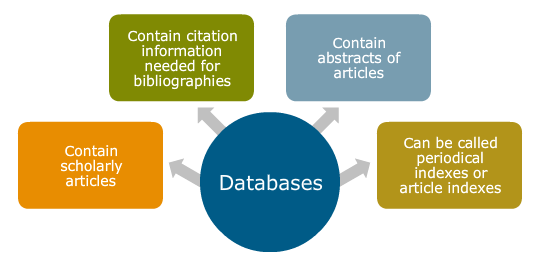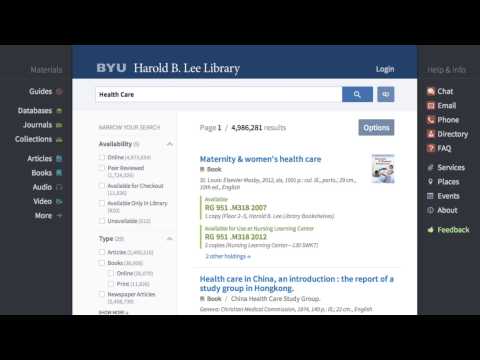9.6: Advanced Search Strategies
- Page ID
- 259575
As we learned earlier, the strongest articles to support your academic writing projects will come from scholarly sources. Finding exactly what you need becomes specialized at this point, and requires a new set of searching strategies beyond even Google Scholar.
For this kind of research, you’ll want to utilize library databases, as this video explains.
Many journals are sponsored by academic associations. Most of your professors belong to some big, general one (such as the Modern Language Association, the American Psychological Association, or the American Physical Society) and one or more smaller ones organized around particular areas of interest and expertise (such as the Association for the Study of Food and Society and the International Association for Statistical Computing).
Finding articles in databases
Your campus library invests a lot of time and care into making sure you have access to the sources you need for your writing projects. Many libraries have online research guides that point you to the best databases for the specific discipline and, perhaps, the specific course. Librarians are eager to help you succeed with your research—it’s their job and they love it!—so don’t be shy about asking.
The following video demonstrates how to search within a library database. While the examples are specific to Northern Virginia Community College, the same general search tips apply to nearly all academic databases. On your school’s library homepage, you should be able to find a general search button and an alphabetized list of databases. Get familiar with your own school’s library homepage to identify the general search features, find databases, and practice searching for specific articles.
- Revision and Adaptation. Provided by: Lumen Learning. License: CC BY-NC-SA: Attribution-NonCommercial-ShareAlike
- Secondary Sources in Their Natural Habitats. Authored by: Amy Guptill. Provided by: The College at Brockport, SUNY. Located at: http://pressbooks.opensuny.org/writing-in-college-from-competence-to-excellence/chapter/4/. Project: Writing in College. License: CC BY-NC-SA: Attribution-NonCommercial-ShareAlike
- ELI-Searching Library Databases. Authored by: NOVALibraries. Located at: https://youtu.be/KwVdyCTus1s. License: CC BY: Attribution. License Terms: Standard YouTube License
- Image of Databases. Authored by: UCI Libraries. Provided by: University of California, Irvine. Located at: http://www.lib.uci.edu/sites/all/tutorials/BeginResearch/public/articles_3.html. License: CC BY-NC-SA: Attribution-NonCommercial-ShareAlike
- HBLL FAQ: Why should I use a library database instead of the internet?. Authored by: iLearningServices. Located at: https://youtu.be/phUqd8nlO5Q. License: All Rights Reserved. License Terms: Standard YouTube License
- Library Search. Authored by: iLearningServices. Located at: https://youtu.be/phUqd8nlO5Q. License: Other. License Terms: Standard YouTube License


